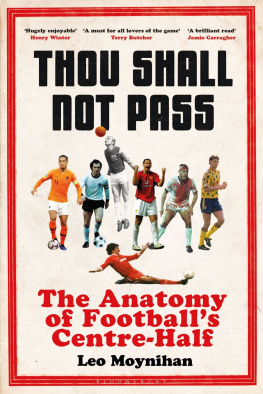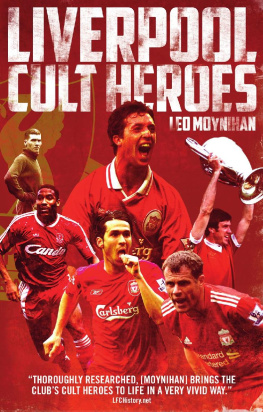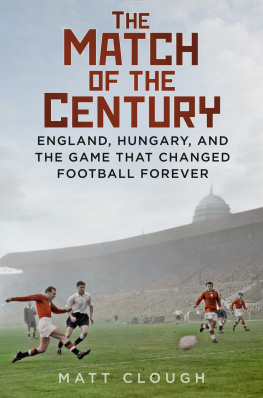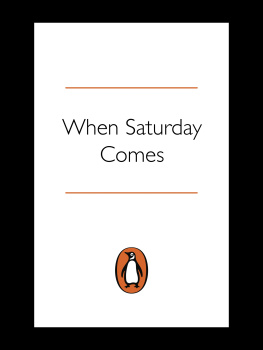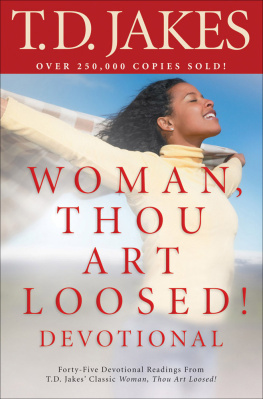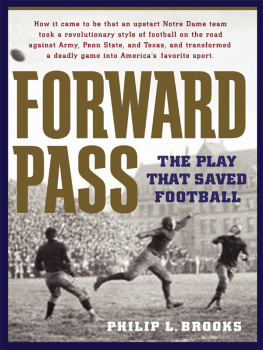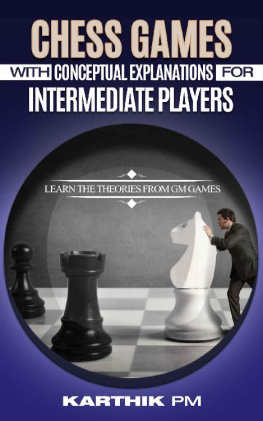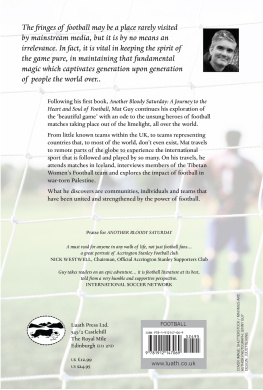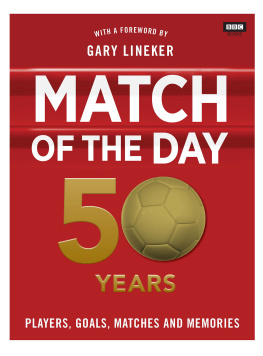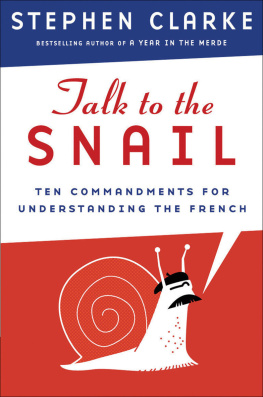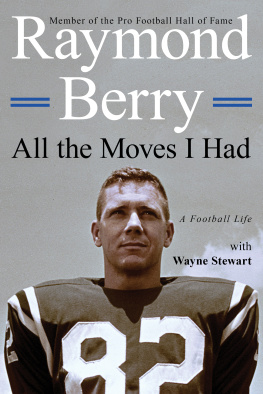
To my daughter, Daisy.
The stylish libero in our little team.

Contents
Introduction:
A Bastard of a Job
1 Fix Bayonets, Lads!:
A Celebration of the Art of Defending
2 Stoppers and Starters:
The Tactical Changes at Centre-Half
3 On Me ead, Son!:
A Look at a Centre-Halfs Most Potent Weapon The Head
4 The Great Marshals:
What Makes Centre-Halves Great Leaders?
5 Vive la Diffrence!:
The Europeans!
6 Hes Behind You!:
The Love/Hate Relationship between Centre-Halves and their Goalkeepers
7 The Dark Arts:
How Centre-Halves Bend the Rules
8 That Type of Samba :
The South Americans
9 No Friends on the Park, Son:
The Epic Battle between Centre-Half and Centre-Forward
10 Artisans in the Mud:
A Celebration of the Ball-Playing Centre-Halves
11 Deadly Duos:
The Great Partnerships
Like Charles Dickens Great Expectations , our story begins on the marshes. The dark flat wilderness, is how the great British author describes his scene, but he could be putting ink to paper and describing Hackney Marshes or any other recreation ground in the land that houses footballers, wiping the sleep from their eyes on a Sunday morning and hoping to make distant dreams come fleetingly true. Among them are centre-halves.
Dickens great novel was first published in 1860, just weeks before Hallam FC first played Sheffield FC, the worlds oldest fixture to date, and while he may have given little regard to the niceties of this strange new pastime, his early description of Magwitch, the escaped convict who startles young Pip in the bleak graveyard, could quite easily be a nations crude version of what a centre-half might look like:
A fearful man, all in coarse grey, with a great iron on his leg. A man with no hat, and with broken shoes, and with an old rag tied round his head. A man who had been soaked in water, and smothered in mud, and lamed by stones, and cut by flints, and stung by nettles, and torn by briars; who limped, and shivered, and glared and growled; and whose teeth chattered in his head as he seized me by the chin.
Thats the thing about centre-halves. They are seen as fearful, perceived as muddied spoilers; cut, stung and torn; glaring and glowering. There to seize pretty young attackers by the chin. But, like Magwitch himself later proves, there is so much more to the subjects of this book than first meets the eye.
Old Trafford, the autumn of 1986. Dressed in a navy suit and maroon tie, Alex Ferguson signs a contract. He is the new manager of Manchester United. His new home was one of the most modern, most envied and most full stadiums in Europe, but the team he inherited struggling in the old First Division needed immediate rebuilding, and having watched them lose 20 at Oxford United days after his arrival, the new manager had no doubts where that construction must start.
At centre-half that afternoon at the Manor Ground, Ferguson played Graeme Hogg and Kevin Moran (Paul McGrath played in midfield). John Aldridge scored a penalty, a Welshman called Neil Slatter got the other and Ferguson left Oxford educated. For he now had knowledge. Those being asked to play in the centre of the teams defence just werent up to it.
Ferguson had got the job on the back of his incredible success at Aberdeen, a provincial club who, under his stringent stewardship, took on and beat giants at home and across the water. Aberdeen were a brilliant attacking unit, with Gordon Strachan and Mark McGhee among its offensive options, but it was the centre-half pairing of Willie Miller and Alex McLeish that afforded him the solidity he so craved. In 1945, Matt Busby had found a club reduced to rubble by war and in need of concrete as well as footballing nous. Over forty years later, Ferguson found the centre of his new teams defence in need of equal attention.
Centre-backs were the foundation of my Manchester United sides, Ferguson has said. Always centre-backs. I looked for stability and consistency. Take Steve Bruce and Gary Pallister; until I found those two we were without a prayer. Paul McGrath was constantly injured, Kevin Moran always had split heads. He was like a punch-drunk boxer by the time I became his manager Graeme Hogg, meanwhile, had not reached the standard we required. So I always told my chairman, We need centre-backs who will play every week. They give you the steadiness and consistency and continuity.
To those who like their football sexed up, Fergusons description might sound a little bland. Steady, consistent, continuous. Good centre-halves can sound like the family car. But, take a closer look and these columns standing steadfast have long contributed so much to the games ability to enthral. Big, brutish and stubborn, those purists trying too hard to push football as the beautiful game might see our protagonists as the unsightly zit on its nose, but dont be fooled. Centre-halves, in whatever shape or size they come, have always added to both the raw drama of a game, and in their own way, its blinding fun. As Ferguson points out, greatness stems from them Always centre-backs.
In May, 1989, Arsenal went to Anfield needing to beat Liverpool by two goals to clinch the First Division title. Their manager, George Graham, a football man with a fondness for the art of central defending, selected three of them. His team needed goals, but he picked three centre-halves, stifled the game and famously won 20. At the heart of the defence, Tony Adams and Steve Bould had been a fixture in Arsenals push for greatness, but that night they were joined by the wily old David OLeary. The Irishmans presence alongside the other two contained Liverpools forward line, and throughout the game, OLeary could be heard shouting, Im taking my two Dobermans for a walk.
Tony Adams liked that, a lot. No doubt Steve Bould did too. Centre-halves, you see, are a proud breed. The centre-half is playing the game but he is also observing it. Square on, they have the action in front of them, and they act. They wait for danger, prepare for it and guard against it. They must do all they can to keep other, presumably more talented opponents at bay, while also organising, cajoling, lecturing, barking.
Over the years, from the Camp Nou to those Hackney Marshes, preconceptions and stereotypes have man marked these man markers. They are the big brutes, leadened by their lack of ambition, mere ogres hell-bent on killing joy. Some of it is true but there is so much more to these misunderstood souls and today they can be celebrated.
The fact that Liverpools Dutch maestro, Virgil van Dijk, stood on the shoulder of Lionel Messi at the 2019 Ballon dOr award ceremony, a gong that many pundits felt he deserved to win, says much for a changing position and for those who had hitherto judged it. Elite coaches such as Pep Guardiola and Jrgen Klopp put their centre-halves at the very core of how they want to play the game. High-tempo, possession football that starts in their own defensive areas with centre-halves who must be able to play.
If football under Guardiola is like a swan, his central defenders are the legs under the surface. Mikel Arteta, Guardiolas one-time assistant at Manchester City, remarked while there that, Our defenders have to play the ball out defend well, maintain our offside line, anticipate know whos pressing you and where the gaps are. After a mistake, youve got to do the difficult thing again no hiding. Txiki Begirstain, his director of football at both Barcelona and Manchester, was a little more succinct: It is, he said, a bastard of a job.

